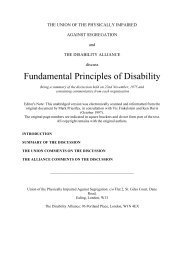Global-Report-Living-Colour-dr2-2
Global-Report-Living-Colour-dr2-2
Global-Report-Living-Colour-dr2-2
You also want an ePaper? Increase the reach of your titles
YUMPU automatically turns print PDFs into web optimized ePapers that Google loves.
78<br />
Inclusive Communities = Stronger Communities<br />
GLOBAL REPORT ON ARTICLE 19: THE RIGHT TO LIVE AND BE INCLUDED IN THE COMMUNITY<br />
NICARAGUA Most sector<br />
organizations work with people with<br />
physical and sensory disability,<br />
although there are initiatives from<br />
small local organizations that develop<br />
specific activities with small groups of<br />
young people with intellectual<br />
disabilities. It is noteworthy that these<br />
actions, while remaining positive, have<br />
in most cases a special focus, as they<br />
become special centers only for people<br />
with intellectual disabilities that provide<br />
a free service for a period of 3-5 hours.<br />
BOLIVIA Many parents are<br />
demanding the creation of institutions<br />
for placing their children with severe<br />
intellectual disabilities, because they<br />
have limited access to rehabilitation<br />
services and information that provide<br />
adequate support within the family<br />
and community. Rehabilitation<br />
institutions are located in intermediate<br />
cities, so there is a need to do<br />
boarding to children out of town, but<br />
their capacity was exceeded largely<br />
because of high demand.<br />
work on projects to raise money to support their<br />
organization. With no residential institutions to speak<br />
of and with strong family networks, these families all<br />
wanted their sons and daughters to have something<br />
meaningful to do during the day other than to just be<br />
at home. The families that we spoke to could not<br />
conceive of adults who are not married living away<br />
from their families. This was an entirely foreign concept<br />
for them. For people with intellectual disabilities and<br />
families day supports serve two purposes; providing<br />
activities and socialization for the adult with intellectual<br />
disabilities and giving the family the ability to work and<br />
to take care of other people in the household.<br />
However, creating day programmes takes the emphasis<br />
away from working and contributing to society through<br />
labour or through entrepreneurship. As with<br />
institutions we have learned that day centres and<br />
sheltered workshops are best avoided. They may<br />
provide respite for families but actually interfere with<br />
including people in their communities. In economies<br />
where many people cannot find work, extraordinary<br />
efforts are needed to support people with intellectual<br />
disabilities in securing and maintaining productive<br />
work. While it is tempting to develop day centres,<br />
experience shows that people stay in them for a<br />
lifetime and they do not lead to inclusion in the<br />
community. In fact, quite to the contrary, they are<br />
isolating and stigmatizing.<br />
From the MENA region we heard, “Since the political<br />
problems started in the region (and this goes back to<br />
right after the Second World War), we have witnessed<br />
more and more violations to the human rights<br />
understanding. In Palestine for instance, children were<br />
denied education and the only way they could access<br />
education was through United Nations Relief and<br />
Works Agency for Palestine Refugees in the Near East<br />
(UNRWA). The agency's main focus was not only<br />
education but health and social assistance as well.



